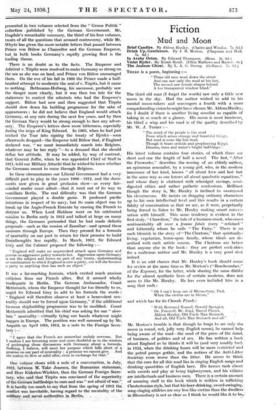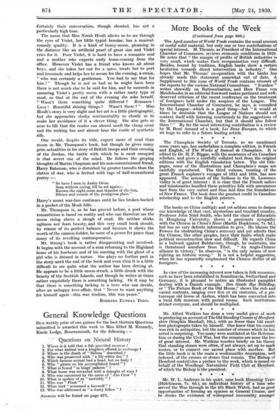Fiction
Mud and Moon
THERE is a poem, beginning ..:-7- " Three old men went down the street And one saw only the mud at his feet, The second saw female shapes behind A too transparent window blind."
The third old man (I forget the words) saw only a little new moon in the sky. Had the author wished to add to his mental moon-rakers and scavengers a fourth with a ,more comprehending vision he might have chosen Mr. AldousHukley, for I doubt if there is another' living novelist as capable of taking in so much at a glance. His moon is most luminous, his blind a wisp and his mud is of the quality described by Mr. W. J. Turner :--
" The mind of the people is like mud
From which arises strange and beautiful things, But mud is-none the less mud,
- Though it bears orchids and prophesying Kings, Dreams, trees and water's-bright-babblings.'::
His latest volume contains four stories, of which three arc Short and one the length of half a novel. The last, "After the Fireworks,".-describes-:the. wooing of an elderly;turithor, an epicurean sensualist, by a young girl, who, in the modern innocence of her kink knows " all about love and lust but in the same way as one knows all about quadratic equations," and whose diary is cluttered- with schoolgirl. ravings, semi- digested ethies and rather pathetic confessions. Brilliant though the story is, Mr. Huxley is inclined to overcrowd his clevernesses. He .insists on dragging ordinary characters up to his own intellectual leYel and ,this results in a certain falsity of conversation so that we are, as it were, perpetually being forced to listen_ to Mr. Huxley making smart conver- sation with himself. This same tendency is evident in the first story, " Chawdron," the tale of a business crook, who Oozes sentimentality all over a femme fatale (very " retained" and kittenish) whom he calls " The Fairy." There is no such blemish in the story of "The Claxtons," that spiritncilly- living, vegetarian, home-spun family, whose ideals are de- scribed with such satiric venom. The Claxtons are better than anyone else in the book : they are perfect cock-shies for a malicious author and Mr. Huxley is a very good 'shot
indeed.
It is, an odd chance that Mr. Huxley's book should come
for review at the same time as Mr: Morton's ("Beachcomber," of the Papress), for the latter, while sharing the same dislike for the almost synthetic liveS of certain moderns, does not Seem to like Mr. Huxley. He htis even included him in a song that ends : " Oh I can't keep out of Bloomsbury, Dad, When the cretins are in bloom," and which has for its Chorale Finale:
" With Bertrand Russell, Oswald Spengler, Dr. yoronoff, Mr. Joad, Marcel Proust, Aldous Hfixley,'Old Uncle Max Steinach And all, Old Uncle Max Steinach and all."
Mr. Morton's trouble is that though he longs to see only the moon (a round, red, jolly very English moon), he cannot help being aware of the mud—the mud of the press of the mind, of business, of politics and of sex. He has written a book about England as he thinks it will be (and very muddy too', in 1936,- when the drinking hours will be more restricted and the petrol punips gothic,'and the notices of the Anti-Litter Societies even worse than the litter. He seems to think that the cure for all this mud lies in singing English songs and drinking- quantities of English beer. His heroes rush about with swords and play at being highwaymen, and his villains are intellectuals and business men. There is a certain amount of amusing stuff in the book which is written 'in rollicking Chestertonian style, but that his-beer.-drinking, sword-swinging, song-singing athleteiare any less-like cretins than the dwellers in-Bloomsbury is not as clear as I think he would like it to be.,
Certainly their conversation; though- shouted, has not a particularly high tone.
The moon that Miss Norah Houk allows us to see through
the eyes of Violet, her little typist heroine, has a musical- comedy quality. It is a kind of honey-moon, gleaming in the distance like an artificial pearl of great size and Violet cries for it. Poor Violet, it is hard to have a romantic soul and a mother who expects early home-coming from the dffice. However Violet has a friend who knows all about boys, and she takes her out for a spree,' treats her to port and lemonade and helps her to secure for the evening, a swain,
" who was certainly a gentleman. You had to say that for him ! " Though he is not so bad as he might have been there is not much else to be said for him, and he succeeds in smearing Violet's pretty moon with a rather nasty type of mud, so that at the end of the evening she asks herself, Wasn't there something quite different ? Romance!
Love ! Beautiful shining things ? Wasn't there ? " Miss Boult's story is very slight and her art is a little photographic, but she approaches slushy sentimentality so closely as to Make her avoidance of it a clever thing. She also gets So near to life that the reader can almost smell the cheap scent and the reeking bar and almost hear the -rustle of synthetic
silk.
One would, despite its title, expect more of mud than pioon in Mr. Thompson's book, but though he gives many grim actualities in his story of British troops and their crossing of the Jordan, the battle with which he is most occupied is that secret one of the mind. He follows the groping thoughts of Martin Chapman and his non-commissioned friend, Harry Bateman, who is disturbed by greater tumults than the clatter of war, who is fretted with tags of half-remembered Poetry :—
" So have I seen in Araby Orion- Seen without :seeing; till he set again-2-- Known the night-noise and thunder of the lion, Silence and sounds of the prodigious plain."
liarry's secret war-fare continues until he lies broken-backed
in a pocket-of the Moakhills. ,
Mr. Thompson is, as he has proved before, a poet NiliOse romanticism is based on reality and who can therefore see the moon rising above a slough of mud. He neither shirks ugliness nor fears beauty, and this very small book should,
by reason -of its balance' because, it- shows the worth of' the cannon-fodder, be more of a power for peace than
many of its revolting contemporaries.
Mr. Strong's book is rather disappointing and involved.
It begins with the account of a man returning to the Highland home of his forebears and of his meeting with the ghost of a
girl who is dressed in tartan. She plays no further part in the story-until-the- end of the book and even then it is a little difficult to see quite what the author has been driving at. Ile appears to be a little moon-struck, a little drunk with the beauty of the Scottish. Islands, and though he writes at times rather exquisitely there is something lacking. Or it may be that there is something lacking in a hero who can decide, after an unhappy love-affair, that " Never to want anything
for himself again—this was this was 'peace."







































 Previous page
Previous page